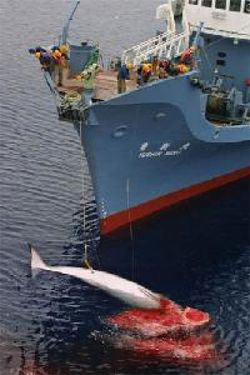Ban whaling vessels from using our ports
 One would assume that an organisation entitled the 'Australia Strategic Policy Institute' would be a government body or a body at least having Australia's strategic interests at heart.
One would assume that an organisation entitled the 'Australia Strategic Policy Institute' would be a government body or a body at least having Australia's strategic interests at heart.
But its director, Dr Anthony Bergin, with a title one would assume would be capable of research, has written an article for Fairfax media supporting Japan's strategic interests.
Bergin's article: 'Ban Protest Vessels from using our Ports' dated 16th January 2010 in The Age and duplicated in the Sydney Morning Herald - (Fairfax empire privilege) sides with the Japanese whalers and calls on the Australian Government to support Japan in denying protesters access to Australian ports. Perhaps Dr Bergin should take up residency in Tokyo.
If Dr Bergin were respectful of the democratic rights to protest we have in Australia and recognised the Japanese incursion in Australia's whale sanctuary in the Southern Ocean, and respected the existence rights of whales, then perhaps his article for Fairfax would have instead read like this...
The Australian Government has been far too even-handed in its statements about the reckless actions of the Japanese whalers trespassing in the Southern Ocean in breach of commercial whaling prohibitions.
By not condemning this annual intrusion by Japanese ships undertaking commercial whaling, Australia is in effect acquiescing in illegal poaching of whales, while Sea Shepherd does Australia's naval monitoring of illegitimate Japanese whale poachers.
Harassment will not change Japan's position on whaling. And not condemning these Japans actions is counterproductive for Australia trying to secure its protection of endangered whales with the International Whaling Commission.
Australia could legitimately take Japan to court and hold Japan in breach of the Antarctic Treaty at the next meeting of the commission in Morocco in June. Australia could legitimately and formally demand Japan to cease its whaling actions immediately.
Given the public interest in these matters, the Australian Government has sensibly asked the Australian Maritime Safety Authority to examine the recent events in the Southern Ocean. But it is hard to see how, on any reading of the Convention on the International Regulations for Preventing Collisions at Sea, that the ramming of the Sea Shepherd vessel by the Japanese whaling vessel, could argue his actions were in compliance with it. The Ady Gill was stationary in the water at the time of the ramming and no action was taken by the Japanese whaling vessel to avoid a collision.
To demonstrate that Australia does not support the activities of the Japanese whalers, the Australian Government should ban the entry of its vessels into Australian ports.
In deciding whether to grant consent to vessels to enter its ports, a state is free to impose conditions as it wishes - access to a port of a state is a privilege, not a right. Australia banned port access to Japanese fishing vessels in 1998 when Japan would not agree on a total allowable catch for southern bluefin tuna in the Commission for the Conservation of Southern Bluefin Tuna. The port access ban was lifted in mid-2001. Why? It is an offence under the Environment Protection and Biodiversity Conservation Act for a whaling vessel to call at an Australian port unless the master has written permission from the environment minister to bring it into the port.
If the Federal Government is serious about ending whaling and shifting the Japanese Government's position - one that has hardened in response - it should directly monitor all whaling activities in the Southern Ocean, follow through on its promise to take legal action against Japan, ban all whaling vessels from Australian ports and ban all use of aircraft from Australian airports for use by Japanese whalers.
Dr Anthony Bergin needs to continue his research and then get back to us with what he has learnt.

Recent comments